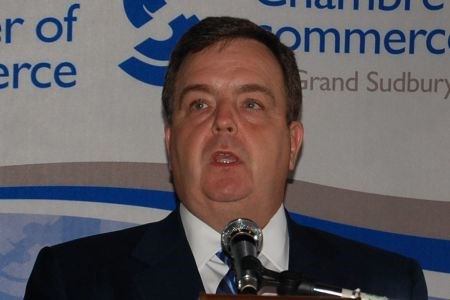Last week's passage of the highly controversial Far North Act was likened to the creation of a provincial park by Ontario Finance Minister Dwight Duncan, following a presentation to the Greater Sudbury Chamber of Commerce on Sept. 27.
“It's all about how we develop the mix of development moving forward and how we make sure that, as we enhance our ability to grow the North, we also enhance our ability to preserve that part which will have enormous appeal in the future,” said Duncan to Northern Ontario Business in an interview following his speech.
“In 1895, (then-Premier) Oliver Mowat created Algonquin Park over a whole lot of objection at the time, and it still remains an enormous tourism magnet. So it's about finding balance, and we'll continue to work with communities across the North to get the right balance, and I'm glad we're having a debate because we needed to have it.”
The act, passed last week in the provincial legislature with a vote of 46-26, dictates the setting aside of 225,000 square kilometres of the region as “protected areas.”
It has been vehemently opposed by a number of prominent groups, including the Ontario Chamber of Commerce, which has said the act would effectively “paralyze” development in the North. Similarly, the chiefs of the Nishnawbe Aski Nation have said the bill violates their treaty rights and that they will not recognize the legislation on their homelands.
Despite arguments from the act's opponents, who say the lack of details in the act creates regulatory uncertainty, Duncan says the Far North Act in fact creates a “greater deal of certainty” in what had previously been a vacuum.
The move, he said, will provide clear guidelines for development and do away with the uncertainty that has been rife in the region.
“I've been hearing that for the entire 15 years that I've been an MPP, that there's been no certainty, and this has been designed to bring greater certainty, and we believe that it will. We believe it'll serve the interests of all Northerners and we'll continue to work with Northern communities, with our First Nations to get it right.”
Duncan was in Sudbury to speak to nearly 50 people gathered at Bryston's on the Park, where he spoke on a variety of subjects relating to the McGuinty government's Open Ontario plan. He specifically touched on spending in the North and its vision for the region.
This includes its view of the mining sector, which was identified as “an important contributor to our entire provincial economy.” The province will work to ensure the industry's investment climate is strong, and that it will have the foundation it needs to succeed -- a strong base of which the Far North Act is now a part, Duncan later added.
Similarly, he touted the $1 billion in investment the province has made in the forest product sector since 2005.
This focus is important, Duncan said, as the province's eventual economic turnaround will be led by Northern Ontario. However, this “dynamic future” for the North will also require the involvement of and consultation with municipalities, industry groups, labour organization, and small business.
“If we don't continue to work with communities and key industries to confront the challenges facing Northern Ontario, we will run a great risk of hindering economic growth and new investment. We must pay attention, we must keep involved; it is our job, it is our duty.”




